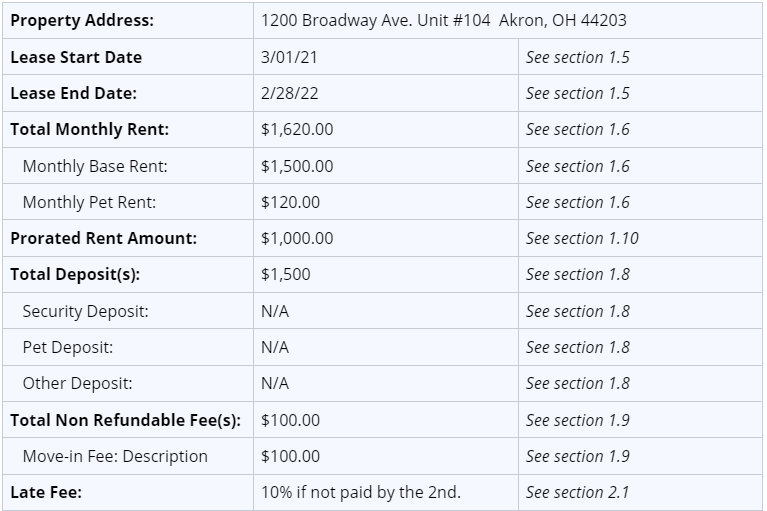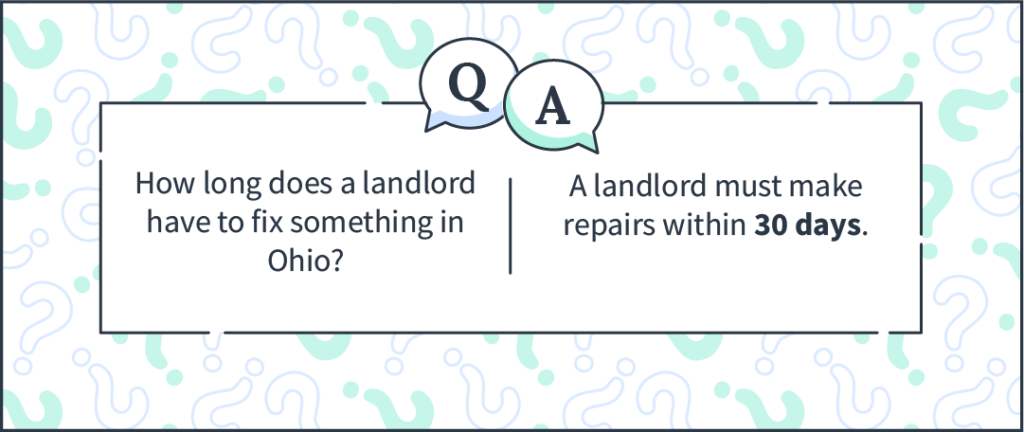Table of Contents
- Ohio Renters’ Rights and Landlord Responsibilities
- Ohio Landlords’ Rights and Tenant Responsibilities
- Application and Screening Fees
- Criminal Background Check
- Security Deposit
- Ohio Lease Agreement Sample
- Ohio Landlord-Tenant Law FAQ
- Due Diligence and Landlord-Tenant Laws in Ohio
- Ohio Landlord-Tenant Law Resources
Ohio is in the Great Lakes region of the U.S. and has both thriving cities and bustling small-towns. Known for its universities, professional sports teams, and its history in the Rust Belt, Ohio is an industrial capital that is constantly growing.

Laws that impact the rental market, landlords, and tenants are constantly being decided in states. Make sure you know what’s on your ballot – find Ohio voting information here.

Ohio Renters’ Rights and Landlord Responsibilities
- Return security deposit within 30 days
- Tenant has 3 days to cure a violation of the lease
- Give reasonable notice of 24 hours before entering rental
When it comes to Ohio rental laws, there are a few specifics landlords need to know:
- Security Deposits – There is no limit in place for what landlords may charge in Ohio for a security deposit. Landlords must return the security deposit within 30 days of a tenant moving out. If landlords do not return the deposit before this time, they must mail or personally give tenants a letter of explanation and a list of the deductions.
- Rent Raises – In Ohio, there are no restrictions on landlords increasing rent as long as they give ample notice. For month-to-month renters, the required notice is 60 days.
- Filing for Eviction – If a tenant violates their lease, they have three days to amend their violation or move out before the landlord is legally able to file for eviction.
- Notice for Entering – Landlords must give reasonable advance notice of 24 hours to enter the rental unit. Landlords may enter the unit without permission only in an emergency such as a fire.
Ohio Landlords’ Rights and Tenant Responsibilities
- Late fees for overdue rent are enforced if reasonable or stated in the lease
- Tenants are expected to keep the property clean and in working order
- Property is abandoned once a tenancy is terminated
- Abandoned Property – Ohio has no laws regarding abandoned property. However, landlords should include a section in the lease that describes what will happen if a tenant leaves any items behind after they move out. Typically, a landlord will store the items for 30 days and send a written notice to the ex-tenant.
- Overdue Rent – Rent is due on the specified date in the lease or rental agreement. Landlords may charge a late fee of $20 or 20% of the late payment.
- Property Maintenance – Tenants must keep the property clean and undamaged. They must also keep all appliances in good working condition as stated in the lease.
- Lead Warning – If your property was built before 1978, you must give your tenant a lead-paint warning and include a section in your rental agreement that provides a warning.
Application and Screening Fees
- HUD (Federal) laws do not classify criminal backgrounds as a protected class, but making a decision to rent based off a criminal background alone could lead to a discrimination charge as it impacts certain protected groups of people disproportionately.
- However, if the criminal background check revealed a crime for the manufacture and distribution of drugs, homicide and/or stalking, denying the application is allowed.
- Landlords should have a consistent and equal policy or procedure in place to follow regarding criminal background checks so as not to discriminate against one class of people over another.
- HUD states that a landlord cannot ask about arrest records, only convictions, as innocent people are commonly arrested though the situation may not have resulted in a conviction.
- Some municipalities may have written their own laws expanding onto what you can and cannot ask regarding criminal backgrounds during the tenant screening process.
Criminal Background Check
The State of Ohio has no added laws or restrictions around the collection of criminal background checks. Adherence to general federal law is required. To avoid the perception of discrimination, make sure your screening criteria is stated and is consistent and equal for all groups of people.
Security Deposit
If the security deposit exceeds $50 (or one month’s rent), Ohio landlords must provide interest to their tenants after six months.
Ohio Lease Agreement Sample
Build an Ohio lease agreement with all of the required disclosures in less than 15 minutes.
There are three sections to a residential lease agreement. The first section outlines the custom details of the contract, such as who’s involved and for what address. Here’s an example Ohio lease agreement listing details found in Section 1:
Ohio Landlord-Tenant Law FAQ
Below are answers to some of the most commonly-asked questions when it comes to landlord-tenant laws in Ohio:
How Long Does a Landlord Have to Fix Something in Ohio?
In Ohio, once notified by a tenant, a landlord has 30 days to make less crucial repairs – if landlords fail to do it within 30 days then tenants have the right to obtain a court order for repairs.
Can a Landlord Enter Without Permission in Ohio?
Landlords can only enter a property without permission in case of an emergency. Landlords must give reasonable notice, usually 24 hours, before entering the property. They also should only enter at reasonable times.
How Long is the Eviction Process in Ohio?
The eviction process in Ohio will vary case by case and depend on the county – visit here for eviction guidelines. In Ohio, after a three-day eviction notice, landlords can proceed with filing for an eviction.
Due Diligence and Landlord-Tenant Laws in Ohio
TurboTenant has utilized many municipal sources along with official state statutes in order to compile this information to the best of our ability. However, local laws are always in flux, and landlords and tenants alike should be sure to do their due diligence and consult legal help when it’s needed. We hope the following list can serve as a valuable resource and allow you to succeed as a landlord or tenant in Ohio. Be sure to take proper precautions when it comes to finding the top candidates for your unit by utilizing our online rental application and tenant screening services.
Disclaimer: TurboTenant, Inc does not provide legal advice. This material has been prepared for informational purposes only. All users are advised to check all applicable local, state, and federal laws and consult legal counsel should questions arise.

Unlimited Everything.
Create a single Ohio lease agreement, or subscribe and receive unlimited lease agreements, landlord forms pack, and e-signs for a simple annual fee. Be confident with all the legal forms and tools you need as a professional landlord.
Discover Our Unlimited PlanOhio Landlord-Tenant Law Resources
Ohio Fair Housing Resources
Federal Fair Housing Resources
- Federal Fair Housing Act
- United States Department of Housing and Urban Development (HUD)
- Civil Rights Act of 1968 (Wikipedia)
Other State Resources
- Ohio Tenant/Landlord Rights and Obligations – Ohio Bar Association
- Ohio Housing Legal Help
- Ohio Termination of Tenancy
- Ohio Tenant-Landlord Law – Guide
Ohio Real Estate Associations
City-Specific Housing Resources
Columbus
- Columbus Fair Housing
- Ohio State Renter Guide
- Columbus Metropolitan Housing Authority
- Columbus REALTORS®
- Columbus Apartment Association
Cincinnati
Kent
Athens
Akron
Toledo
- Toledo Landlord Tenant and Responsibilities
- Toledo Fair Housing
- Resources for Landlords
- FAQ for Landlords
- Toledo Regional Association of REALTORS
Oxford
Cleveland
- Cleveland Fair Housing
- Cleveland Housing Resources
- Northeast Ohio Apartment Association – Cleveland
- Cleveland REALTORS
Dayton
Springfield







